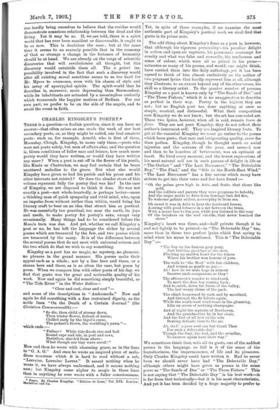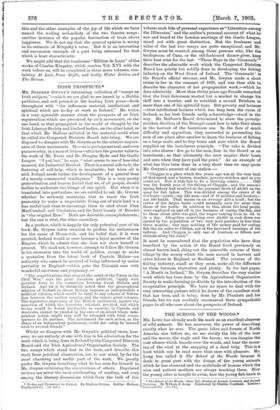CHARLES KINGSLEY'S POETRY.*
THERE is a question—a foolish question, since it can have no answer—that often arises as one reads the work of our best secondary poets, or, as they might be called, our best amateur poets : such as, for example, Arnold, who is first of them, Macaulay, Clough, Kingsley, to name only these,—poets who were not poets solely, but men of affairs also; and the question is, Given conditions of fuller ease and leisure, how much more poetry would they have written, or would they have written any more ? When a poet is cut off in the flower of his youth, like Keats-or Chatterton, we may feel certain that he bears unuttered melodies to the grave. But what else would Kingsley have given us had his parish and his prose and his other interests not existed ? Or does the slender store of this volume represent fully the poetry that was his P In the case of Kingsley, we are disposed to think it does. He was not exactly a poet—not whole-heartedly, is perhaps better—more a thinking man of quick sympathy and vivid mind, who, upon an impulse from without rather than within, would bring his literary craft to bear on an idea that struck him as poetical. He was essentially too practical, too near the earth, its joys and needs, to make poetry for poetry's sake, except very occasionally. Many things had to be considered before the Muse's turn was due. And yet, whether we call Kingsley a poet or no, he has left the language the richer by several poems which are treasured by the few, and two poems which are treasured by the many. It is of the difference between the several poems that do not meet with universal esteem and the two which do that we wish to say something.
Kingsley as a poet has no magic, no mystery, no glamour, no phrases in the grand manner. His poems make their appeal each as a whole ; not by a line here and there, or a stanza here and there, as is so often the case, but poem by poem. When we compare him with other poets of his day, we find that gusto was the great and noticeable quality of his work. Now and again he did something simply beautiful, as 4' The Tide River" in the Water Babies— "Clear and cool, clear and cool"— and some of the descriptions in "Andromeda." Now and again he did something with a fine restrained dignity, as the noble lines "On the Death of a Certain Journal" (the Christian Commonwealth) :— " So die, thou child of stormy dawn, Thou winter flower, forlorn of nurse; Chilled early by the bigot's curse, The pedant's frown, the worldling's yawn "-
'which ends :—
"Failure ? While tide-floods rise and boil Round cape and isle, in port and cove, Resistless, star-led from above : What though our tiny wave recoil!"
Now and then he wrote with charming grace, as in the lines to "G. A. G." And once he wrote an inspired piece of melo- dious nonsense which it is hard to read without a sob, "Lorraine, Lorraine Lorree." It meant nothing when be wrote it, we have always understood, and it means nothing now ;but Kingsley came nigher to magic in these lines than in anything he ever wrote with a fuller consciousness.
• Poem-% By Charles Kingsley. "Edition de Luxe," Vol. XVL London : Macmillan and Co.
Yet, in spite of these examples, if we examine the most authentic part of Kingsley's poetical work we shall find that gusto is its prime note.
The odd thing about Kingsley's fame as a poet is, however, that although his vigorous personality—his peculiar delight in action and open-air raptures, his passionate contempt for cruelty and what was false and cowardly, his tenderness and sense of colour, which were all so prized in his prose— saturates so many of his poems, and would, one might think, have carried them into the daily anthology, yet it has been agreed to think of him almost exclusively as the author of two poignant lyrics that hardly represent him at all, although they illustrate, to an extent beyond any of his other verses, his skill as a literary artist. To the greater number of persons
Kingsley as a poet is known only by "The Sands of Dee" and "The Three Fishers," which it is no exaggeration to describe as perfect in their way. Poetry in the highest they are not; but no English poet has done anything at once so simple, musical, and distressfuL What their composition cost Kingsley we do not know; but the art has concealed art. These two lyrics, however, when all is said, remain tours de force. They are not pure Kingsley, they do not reflect their author's innermost self. They are inspired literary feats. To
get at the essential Kingsley we must go rather to the poems which have gusto, that rare and invigorating quality, rarer far than pathos. Kingsley, though he thought much on social injustice and the sorrows of the poor, and seemed now and then to be hopeless of betterment, was an optimist at heart. He lived every moment, and the truest expressions of his most natural self are in such paeans of delight in life as "The Outlaw" and "The Last Buccaneer," "The Delectable Day," "The Find," and the "Ode to the North-East Wind."
"The Last Buccaneer" has a fine savour which many have striven to get into their verse and few have found :- "Oh the palms grew high in Ayes, and fruits that shone like gold,
And the colibris and parrots they were gorgeous to behold; And the negro maids to Ayes from bondage fast did flee, To welcome gallant sailors, a-sweeping in from sea.
Oh sweet it was in Ayes to hear the landward breeze, A-swing with good tobacco in a net between the trees, With a negro lass to fan you, while you listened to the roar
Of the breakers on the reef outside, that never touched the
shore."
Kingsley's heart was there, and—half private though it be and not lightly to be printed—in "The Delectable Day" too, more than in those two perfect lyrics which first spring to mind when his name is mentioned. This is "The Delectable Day"
"The boy on the famous grey pony, Just bidding good-bye at the door, Plucking up maiden heart for the fences
Where his brother won honour of yore.
The walk to 'the Meet' with fair children, And women as gentle as gay,— Ah ! how do we male hogs in armour Deserve such companions as they ?
The afternoon's wander to windward, To meet the dear boy coming back; And to catch, down the turns of the valley, The last weary chime of the pack.
The climb homeward by park and by moorland, And through the fir forests again, While the south-west wind roars in the gloaming, Like an ocean of seething champagne.
And at night the septette of Beethoven, And the grandmother by in her chair, And the foot of all feet on the sofa Beating delicate time to the air.
An, God ! a poor soul can but thank Thee For such a delectable day !
Though the fury, the fool, and the swindler, To-morrow again have their way."
We sometimes think that, with all its gusto, one of the saddest poems in the language, so full is it of the sense of the
transitoriness, the impermanence, of life and its pleasures. Only Charles Kingsley could have written it. Had he never
been we should never have had "The Delectable Day," although others might have given us poems in the same genre as "The Sands of Dee" or "The Three Fishers." This
is not saying that "The Delectable Day" is his best work—it is far from that technically—but it is his most characteristic.
And yet it has been decided by a huge majority to prefer to this and the other examples of the joy of life which we have named the wailing melancholy of the two famous songs : another instance of the popular fascination of tears above happiness. We do not say that the general opinion is wrong in its estimate of Kingsley's verse. But it is an interesting and uncommon example of a poet being esteemed for that which is least characteristic.
We might add that the handsome "Edition de Luxe" of the works of Charles Kingsley, which reaches Vol. XVI. with the work before us, will be completed in three more volumes, con- taining At Last, Prose Idylls, and lastly, Water Babies, and The Heroes.











































 Previous page
Previous page